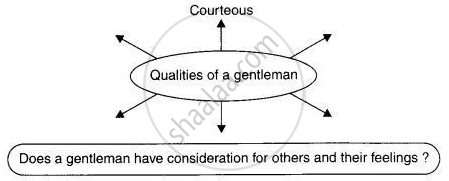Advertisements
Advertisements
प्रश्न
Based on your reading of the story answer the following question by ticking the
correct option.
Nicola was not pleased when Jacopo asked the narrator to drive them to Poleta as he
पर्याय
did not want a stranger to become involved with their plans
preferred going to Poleta by train so that he could enjoy the scenery
did not want to ask anyone for favours
did not want to take help from someone he did not know well
उत्तर
did not want a stranger to become involved with their plans
APPEARS IN
संबंधित प्रश्न
What are the qualities of a "gentleman"? Work with your partner and complete
the following web-chart by listing the qualities of a gentleman.

Based on your reading of the story answer the following question by ticking the
correct option.
The narrator was most impressed by the boys'
Based on your reading of the story answer the following question by ticking the
correct option.
The author did not speak to the boys on their return journey because.
What do you understand by the following statement?
"We do many things, sir," Nicola answered seriously. He glanced at us hopefully.
Answer the following question briefly.
Why were the narrator and his companion impressed by the two boys?
Answer the following question briefly.
How were the boys useful to the author?
Answer the following question briefly.
Why were the boys in the deserted square at night? What character traits do they
exhibit?
Discuss the following question and write the answers in your notebook.
How does the story 'Two Gentlemen of Verona' promise hope for society?
Two Gentlemen of Verona is written in the first person. A story written in the first person is a first-hand account of events told or narrated through the eyes of a single character, typically the main character. Stories written in the first person are easily identified by the use of the pronoun 'I' rather than 'he or she'.
The reader will see phrases such as "I said, I thought," rather than "he said, she thought." Everything is experienced through the eyes of a single character, and all thoughts and observations are limited to that one person. There can be no outside observer. If the narrator does not see or experience an event first-hand, it cannot be a part of the story. All scenes in the story are filtered through this person's unique perception.
The third-person is a narrative mode in which both the reader and author observe the situation either through the senses and thoughts of more than one character, or through an overarching godlike perspective that sees and knows everything that happens and everything the characters are thinking. In this mode of narration, the narrator can tell the reader things that the main character does not know, or things that none of the characters know.
Rewrite, in third person, any part of story you like
After her brothers' visit, Lucia writes a page in her diary about her past life and
her present situation. As Lucia, write the diary entry in about 150 words.
